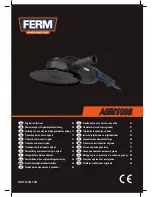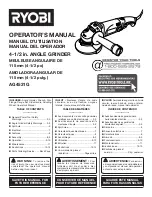
16
| English
1 609 929 N96 | (29.10.08)
Bosch Power Tools
The vibration emission level given in this infor-
mation sheet has been measured in accordance
with a standardised test given in EN 60745 and
may be used to compare one tool with another.
It may be used for a preliminary assessment of
exposure.
The declared vibration emission level repre-
sents the main applications of the tool. However
if the tool is used for different applications, with
different accessories or poorly maintained, the
vibration emission may differ. This may signifi-
cantly increase the exposure level over the total
working period.
An estimation of the level of exposure to vibra-
tion should also take into account the times
when the tool is switched off or when it is run-
ning but not actually doing the job. This may sig-
nificantly reduce the exposure level over the to-
tal working period.
Identify additional safety measures to protect
the operator from the effects of vibration such
as: maintain the tool and the accessories, keep
the hands warm, organisation of work patterns.
Declaration of Conformity
We declare under our sole responsibility that
the product described under “Technical Data” is
in conformity with the following standards or
standardization documents: EN 60745 accord-
ing to the provisions of the directives
2004/108/EC, 98/37/EC (until 28 Dec 2009),
2006/42/EC (from 29 Dec 2009).
Technical file at:
Robert Bosch GmbH, PT/ESC,
D-70745 Leinfelden-Echterdingen
Robert Bosch GmbH, Power Tools Division
D-70745 Leinfelden-Echterdingen
31.07.2008
Assembly
f
Before any work on the machine itself, pull
the mains plug.
Dust/Chip Extraction
f
Dusts from materials such as lead-containing
coatings, some wood types, minerals and
metal can be harmful to one’s health. Touch-
ing or breathing-in the dusts can cause aller-
gic reactions and/or lead to respiratory infec-
tions of the user or bystanders.
Certain dusts, such as oak or beech dust, are
considered as carcinogenic, especially in
connection with wood-treatment additives
(chromate, wood preservative). Materials
containing asbestos may only be worked by
specialists.
– Use dust extraction whenever possible.
– Provide for good ventilation of the work-
ing place.
– It is recommended to wear a P2 filter-
class respirator.
Observe the relevant regulations in your
country for the materials to be worked.
Integrated Dust Extraction with Dust Box
(see figures D1– D4)
Attach the dust box
1
onto the extraction outlet
8
until it latches.
To empty the dust box
1
, press the latching
levers
9
on the side of the dust box (
n
). Pull off
the dust box toward the bottom (
o
).
Before opening the dust box
1
, it is recommend-
ed to loosen the dust from the filter element by
gently striking it against a firm support (as
shown in the figure).
Grasp the dust box
1
by the recessed grip, fold
the filter element
10
upward and empty the dust
box. Clean the thin plates of the filter element
10
with a soft brush.
External Dust Extraction (see figure E)
Slide the extraction adapter
11
onto the outlet
piece
8
. Ensure that the latching levers of the
extraction adapter engage. The extraction
adapter
11
accepts a vacuum hose with a diam-
eter of 19 mm.
Dr. Egbert Schneider
Senior Vice President
Engineering
Dr. Eckerhard Strötgen
Head of Product
Certification
OBJ_BUCH-15-004.book Page 16 Wednesday, October 29, 2008 1:19 PM
















































